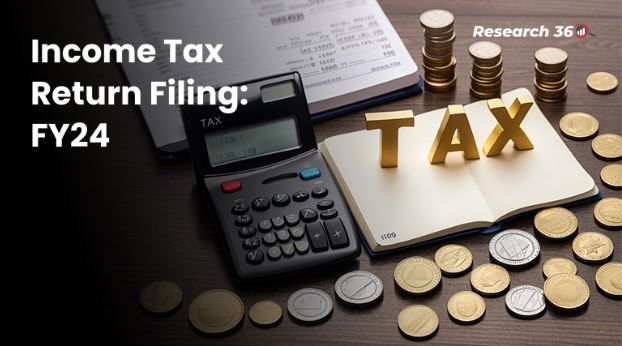Current Income Tax Return Filing Due Dates for FY 2024

In this article, we'll first cover the different taxpayer categories and types of returns before delving into the specifics of income tax return filing due dates for FY 2024. Also, we’ll look at a few reasons why you should file your income tax return and the consequences of not filing them on time.
With the close of the financial year 2023-2024, taxpayers across India are gearing up to file their annual income tax returns (ITRs). If you’re a new taxpayer, knowing the last date for ITR filing is crucial to ensuring compliance and avoiding the consequences of not filing the returns on time. One of the key things that you should note is that the last date for ITR filing can vary depending on the taxpayer category applicable to you and the type of return you’re filing.
What are the Various Categories of Taxpayers?
The Income Tax Act of 1961 classifies taxpayers into eight different categories. The type of income tax return you need to file may vary depending on the taxpayer category you fall under. Here’s the list of the various categories.
Individuals
Hindu Undivided Family (HUF)
Association of Persons (AOP)
Body of Individuals (BOI)
Partnership Firms
Companies
Local Authority
Artificial Judicial Person
What are the Different Types of Income Tax Returns?
Before we check out the last date for ITR filing, let’s take an in-depth look at the different types of income tax returns designed by the Income Tax Department (ITD). Currently, there are a total of seven types of income tax returns you can file. However, the ITR that you need to file with the department depends on your taxpayer category and the nature of the income you generate.
ITR-1
ITR-1 (SAHAJ) is the most common type of income tax return that’s filed in India. Resident individuals earning an annual income of less than or equal to Rs. 50 lakh from the following sources of income must file this return.
Income from salaries, including pensions
Income from one house property
Income from other sources
Income from agriculture (up to Rs. 5,000)
ITR-2
Hindu Undivided Families (HUFs) and individuals classified as resident, resident but not ordinarily a resident (RNOR) and non-resident must file ITR-2 if their total taxable income is greater than Rs. 50 lakh during a financial year. If your income is from any of the following sources, you must file this return to declare them.
Income from salaries, including pensions
Income from more than one house property Income from other sources
Income from capital gains, including gains from cryptocurrencies
Income from agriculture (more than Rs. 5,000)
Foreign income and income from foreign assets
ITR-3
All categories of individuals and Hindu Undivided Families that generate income from a business or a profession must file ITR-3. Additionally, if you satisfy any of the following conditions, you should file this return to declare your income.
Hold the post of director in a company or as a partner in a partnership firm
Hold unlisted equity shares
Generate income from any of the categories mentioned in ITR-2
ITR-4
Resident individuals, Hindu Undivided Families, and partnership firms earning an annual income of less than or equal to Rs. 50 lakh from the following heads of income must file an ITR-4 (SUGAM).
Presumptive income from business or profession (Section 44AD, 44AE or 44ADA)
Income from salaries, including pensions
Income from one house property
Income from other sources
ITR-5
Non-individual entities such as partnership firms, Limited Liability Partnerships (LLPs), Association of Persons (AOP) and Body of Individuals (BOI) must report their income through ITR-5.
ITR-6
Private limited, public limited and one-person companies that are not claiming any exemption under Section 11 of the Income Tax Act of 1961 must use ITR-6 to report the income they earn during a financial year.
ITR-7
Companies and individuals required to report their income under the following list of sections of the Income Tax Act of 1961 must file ITR-7.
Section 139(4A)
Section 139(4B)
Section 139(4C)
Section 139(4D)
Section 139(4E)
Section 139(4F)
Income Tax Return Filing Due Dates for the Financial Year 2023-2024
Now that you are aware of the categories of taxpayers and the types of income tax returns, let us look at the last date for ITR filing for the financial year 2023-2024.
It is important to remember that the due date for filing returns may vary depending on the taxpayer category and whether the returns are classified as original, belated or revised.
Furthermore, the dates may also vary depending on whether you are eligible for a tax audit or not. If your income from a business or profession during any previous financial year exceeded Rs. 1 crore or Rs. 50 lakh, respectively, you must mandatorily get your accounts audited.
ITR Due Dates for Original Returns
Original returns are the income tax returns that you file for the first time during the assessment year within the specified due date. The last date for ITR filing of original returns is as follows.
ITR Due Dates for Belated and Revised Returns
The income tax returns you file after the specified due date are termed belated returns. Meanwhile, the income tax returns you file to rectify errors, mistakes, or omissions in the original returns are termed revised returns. The last dates for ITR filing of belated and revised returns are as follows.
Taxpayer Category | Last date for ITR Filing |
|---|---|
All individuals and HUFs | 31.12.2024 |
Partner of a Partnership Firm | 31.12.2024 |
Non-Individual Entities Except Companies | 31.12.2024 |
Companies | 31.12.2024 |
Taxpayers under Section 92E | 31.12.2024 |
Note: The last date for ITR filing specified above is as per the Income Tax Act of 1961. In rare cases, the Finance Ministry and the Income Tax Department may extend the due date for filing returns by a few days. Therefore, it is advisable to regularly check the latest news for income tax due date extensions. However, it is also essential to keep in mind that such extensions are not the norm; instead, they are only granted in extraordinary circumstances.
Consequences of Not Filing Income Tax Returns Within the Due Date
Failing to file income tax returns within the specified due dates can have several severe consequences. Here’s an overview of the negative ramifications of not filing returns on time.
Penalty
If you don’t file your original ITR within the due date specified for original returns but manage to file it within the due date for belated returns, you will be liable to pay a penalty for late filing. If your total income is below Rs. 5 lakh, the late filing penalty is Rs. 1,000. However, if your total income is above Rs. 5 lakh, the penalty increases to Rs. 5,000.
Imprisonment
The Income Tax Department can initiate legal proceedings against you if you don’t file your returns, even after receiving a notice for the same. In this case, the term of imprisonment can be anywhere from three months to two years, along with a fine. However, for more severe cases, the term of imprisonment could extend up to 7 years.
Disallowance from Setting Off Losses
If you miss the last date for ITR filing, you may be disallowed from carrying forward business and capital losses to the subsequent years to set them off.
Conclusion
Usually, the starting date for filing income tax returns will be notified by the Income Tax Department around April of every year. As of now, the ITR filing start date for AY 2024-25 has not been notified yet. However, it is likely to follow the same pattern as that of the previous financial year.


















